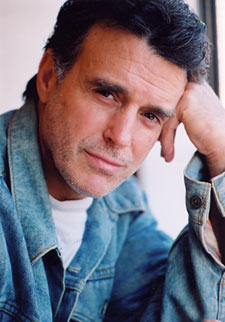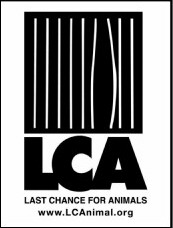LAST CHANCE FOR ANIMALS FOUNDER CHRIS DEROSE


Chris DeRose is an animal rights activist recipient of the 1977 ‘Courage of Conscience’ International Peace Award and a former actor. He appeared on General Hospital, Cagney and Lacey, CHiPs, The Rockford Files andBaretta. He was an on-camera reporter for the television shows Hard Copy and Inside Edition.
DeRose was born in Brooklyn, New York. He is the founder and president of Last Chance for Animals and the author of the book In Your Face: From Actor to Animal Activist. DeRose has been arrested 11 times and jailed 4 times for opposing animal cruelty, including his participation in a break-in at the UCLA Brain Research Institute in 1988. DeRose was fired from General Hospital when he had to go to jail.
DeRose appeared in the 2006 HBO Documentary “Dealing Dogs” along with an undercover animal rights activist known as “Pete” and other activists of Last Chance for Animals. Together, they uncovered mistreatment of animals on a large scale at the Martin Creek Kennel in Arkansas. They were successful in closing down the operation and subsequently found homes for the mistreated dogs that were being sold to labs for experimentation.
“Dealing Dogs” documents the project that was designed to expose Martin Creek Kennel’s inhumane treatment of dogs and violations of the law. The investigation was initiated by Last Chance for Animals, a Los Angeles-based animal-rights group. Chris DeRose, the founder and president of Last Chance for Animals, said he hoped “Dealing Dogs” would speed the passage of the Pet Safety and Protection Act, which amends the Animal Welfare Act to ensure that dogs and cats used by research facilities are obtained legally. “We want to put them out of business,” Mr. DeRose said of the crooked Class B dealers.
One of DeRose’s most controversial actions was arranging for two undercover operatives to pay Wisconsin animal dealer Erving Stebane $50 to kill and butcher a dog while DeRose secretly videotaped the action. Felony charges were filed against the dealer, but in June 1993 Calumet County circuit judge Donald Poppy ruled that the case constituted illegal entrapment and ordered the return of 143 dogs which had been seized.
In an interview with Kit Pavarenti,DeRose grimaces at the words. “I made a painful decision,” he admits, “and a dog died.” The memory of that night still carries more than its share of remorse. To fend it off, he reminds us and himself that the dog’s death was imminent, with or without the presence of a camera, and that the camera brought at least some degree of meaning to its sacrifice.
Indeed, the public outrage precipitated by the case galvanized not only the community, but drew the attention of U.S. Representative Toy Roth (D-WI), who introduced the Stebane Bill,” legislation designed to strengthen penalties for violations of the Animal Welfare Act. Roth also wrote a letter to Mike Espy, Secretary of Agriculture, voicing his deep concerns with unlawful Class B vendor activities. His sentiments are echoed by U.S. Senator Fiengold (R-WI).
DeRose received the 1997 Courage of Conscience International Peace Award and once worked as a police officer and an investigator. In 2006, he became the Director of Animal Welfare (DAW) for West Hollywood, California.
“Chris is one of the most passionate people that I have come across on the UCW Radio Show, his commitment to the organization that he founded, Last Chance For Animals, as well as his commitment to kids in need, being an undocumented Big Brother to dozens, is astounding, it was an honor and pleasure to have him on the show and look forward to following up with him in the near future,” said Louis Velazquez host of the UCW Radio Show
About Last Chance For Animals
Founded in 1984 by Hollywood actor Chris DeRose, Last Chance For Animals has its roots in fighting and exposing the inherent cruelty of vivisection. In the organization’s early years, DeRose led teams of dedicated activists employing non-violent strategies modeled after social movements led by such leaders as Mahatma Gandhi and Martin Luther King, Jr.
Using “Direct Action,” LCA activists engaged in peaceful protest with determined resolve… to make sure their voices would be heard. When direct action was still a new concept in the American animal rights movement, every well-planned demonstration achieved tremendous media coverage. By the late 1980s, LCA was earning a national reputation for its no-nonsense approach to exposing animal cruelty. Though dozens of activists faced arrest and some even faced extended jail time for charges such as trespassing, LCA is proud that its direct action protests have never caused injury to a person who was not voluntarily involved (i.e., some activists themselves were injured due to being forcefully ejected from the protest).
With its national reputation growing, LCA received support from around the country, and around the world — from caring people who decided that it was time to fight peacefully yet fight hard… staging direct action, and gathering evidence to send animal abusers to jail.
With an increased budget and staff, LCA expanded its focus beyond vivisection. In the 1980s and 1990s, LCA has worked on virtually every animal rights issue, including farming, fur and animals in entertainment. LCA’s primary focuses are vivisection, pet theft, fur, and circuses.

Websites: www.lcanimal.org




